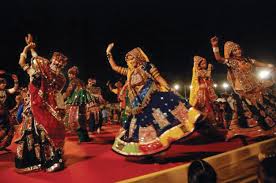The 9
nights festival of Navratri begins on the first day of Ashwina of the
bright fortnight. Seeds are sown, sprouting is watched, the planets are
consecrated, and on the 8th and 9th days, Goddess Durga, Vijayashtami
and
Mahanavami are worshipped.
The Devi Mahatmya and other texts invoking the Goddess who vanquished demons are cited.
The day after
Navratri i.e. the 10th day after Ashwina, is Dussera which celebrates
the victory of lord Rama over Ravana. Ravana is burnt in effigy, often
giant dummies of Ravana stuffed
with fireworks are shot with arrows
until they blow up before a large, applauding audience.
The day
after Navratri i.e. the 10th day after Ashwina, is Dussera which
celebrates the victory of lord Rama over Ravana. Ravana is burnt in
effigy, often giant dummies of Ravana stuffed with fireworks are shot with arrows util they blow up before a large, applauding audience.
The most characteristic dances of Gujarat during Navratri are the Rasa and Garba dances which are performed at all levels of society by men and women.The Rasa is performed in Gujarat India on Navaratra;The most impressive artistry of the Rasa dances of Gujarat and Saurashtra is displayed in the Dandiya Rasa by men. It is a counterpart of the Garba of the women. The dancers use sticks at the end of which tiny bells (ghungrus) are tied so that they give off a clear jingling sound when they strike one another. This dance has a very complicated rhythm pattern and even though the dancers begin in a slow tempo, the dance develops in such manner that each person in the circle not only performs a solo dance with his own sticks, but also has a complex multiple relationship with both his partners on either side as also partners opposite him in the circles. The circle keeps breaking sometimes into two concentric circles and sometimes into three or four circles within the orbit of a larger circle.Today in the cities and town the dance is a social activity and entertainment rather than religious agricultural or fertility symbol.
Navratri Festival Start from 16th to 24thOctober 2012
Navratri fest 2011
Navratri fest 2012
Navratri special Food Recipes
The most characteristic dances of Gujarat during Navratri are the Rasa and Garba dances which are performed at all levels of society by men and women.The Rasa is performed in Gujarat India on Navaratra;The most impressive artistry of the Rasa dances of Gujarat and Saurashtra is displayed in the Dandiya Rasa by men. It is a counterpart of the Garba of the women. The dancers use sticks at the end of which tiny bells (ghungrus) are tied so that they give off a clear jingling sound when they strike one another. This dance has a very complicated rhythm pattern and even though the dancers begin in a slow tempo, the dance develops in such manner that each person in the circle not only performs a solo dance with his own sticks, but also has a complex multiple relationship with both his partners on either side as also partners opposite him in the circles. The circle keeps breaking sometimes into two concentric circles and sometimes into three or four circles within the orbit of a larger circle.Today in the cities and town the dance is a social activity and entertainment rather than religious agricultural or fertility symbol.
Ahmedabad is
one of the greatest places to enjoy Navratri. All kinds of Rasa-Garbas,
Dandia ras etc. are practiced in this period, feasting and fasting are
important cultural aspects of this day, and various rituals are
performed at temples of the 9 Goddesses of Hinduism. The atmosphere is
electric and revelry is in the air. The best places to enjoy the
atmosphere of Navratri in Ahmedabad.
Navratri dress


Navratri dress
Navratri Festival Start from 16th to 24thOctober 2012
Navratri special Food Recipes
















